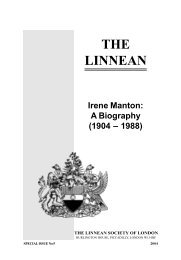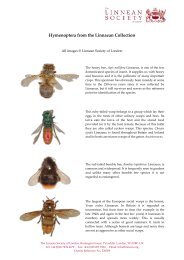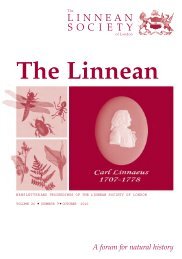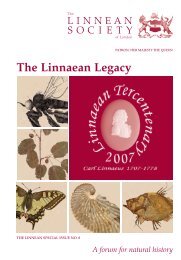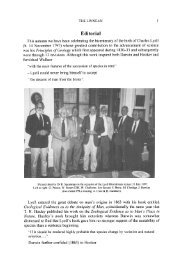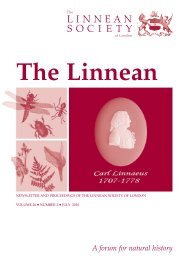Vol 25, no 3, October - The Linnean Society of London
Vol 25, no 3, October - The Linnean Society of London
Vol 25, no 3, October - The Linnean Society of London
You also want an ePaper? Increase the reach of your titles
YUMPU automatically turns print PDFs into web optimized ePapers that Google loves.
22<br />
THE LINNEAN 2009 VOLUME <strong>25</strong>(3)<br />
poetic imagination <strong>of</strong> William Wordsworth, who was a student at Cambridge University,<br />
like Darwin, though roughly fifty years earlier. To the Romantic mind forests, like all<br />
‘wild’ nature, <strong>of</strong>fered excitement, adventure, and challenge to the over-ordered, onesidedly<br />
rational character <strong>of</strong> modern man: they mirrored the strange and unfathomable<br />
depths <strong>of</strong> the human mind and soul, as otherwise only art, poetry or music could, or<br />
the emotions <strong>of</strong> love, or the realm <strong>of</strong> dreams. ‘Wild’, ‘chaotic’, ‘raw’ nature was<br />
something awesome and sublime, as Emanuel Kant had it, because it was ‘infinite’<br />
and beyond any narrow usefulness. It displayed ‘final form’ as art did, precisely through<br />
its apparent chaos. To use Ehrenzweig’s phrase, ‘untamed’ nature expressed ‘the higher<br />
order <strong>of</strong> chaos’.<br />
Once again, we are amazed that the young Darwin, who would later give the<br />
world the <strong>The</strong>ory <strong>of</strong> Evolution, thought thus in 1832. For Evolution was to provide a<br />
most powerful impetus to the second great wave <strong>of</strong> Romanticism in the second half <strong>of</strong><br />
the Nineteenth Century, and in the Twentieth Century up until the First World War.<br />
Friedrich Nieztsche, Rimbaud, and Lautréamont are among those who were thrilled<br />
and enthralled by the subversiveness, the struggle and challenge forced upon the human<br />
mind by Darwin; the complete decentering <strong>of</strong> man that his theory entailed – far more<br />
even than the Galilean-Newtonian revolution had, and the final defeat <strong>of</strong> theology<br />
that it appeared to them to represent.<br />
As for the influence <strong>of</strong> these last upon subsequent artists, poets, composers, and<br />
philosophers the list would be almost impossible to complete. Among them Otto Dix,<br />
Scriabin, Mahler, Richard Strauss, and the Surrealists stand out. But the influence <strong>of</strong><br />
Nietzsche especially on art and culture was and is immeasurable.<br />
<strong>The</strong>se remarks pertain to the worlds <strong>of</strong> literature, art, and philosophy: how equally<br />
much did Evolution transform all science itself, and <strong>no</strong>ne less than the human sciences.<br />
In his influence upon, and the admiration he induced in Karl Marx and Friedrich<br />
Engels, and in the emergence <strong>of</strong> Sociology and Anthropology as disciplines, Darwin<br />
was the Copernicus <strong>of</strong> the modern mind.<br />
But <strong>of</strong> course, the whole nature <strong>of</strong> the Beagle’s voyage must be borne in mind, as<br />
this is well summarized here by Gillian Beer (in an essay called Travelling <strong>The</strong> Other<br />
Way):<br />
“(Such) voyages......were those whose prize was represented as k<strong>no</strong>wledge rather than<br />
treasure. <strong>The</strong> categories are, however, <strong>no</strong>t altogether separate. Although the nineteenthcentury<br />
journeys that set out from Britain to survey the sea and coasts around the world<br />
were <strong>no</strong>t piratical, <strong>no</strong>t part <strong>of</strong> that unconcerned predation that earlier centuries justified<br />
as exploration or discovery, they were nevertheless an expression <strong>of</strong> the will to control,<br />
categorise, occupy and bring home the prize <strong>of</strong> samples and <strong>of</strong> strategic information.<br />
Natural history and national future were closely interlocked. And natural history was<br />
usually a sub-genre in the programme <strong>of</strong> the enterprize, subordinate to the search for<br />
sea-passages or the mapping <strong>of</strong> feasible routes and harbours.”<br />
Indeed, in their historical study Tierra del Fuego, Luiz and Schillat show that the<br />
Beagle voyages under Captain Fitzroy’s command were largely concerned with<br />
garnering information for the British Admiralty, as part <strong>of</strong> a widely-embracing concern<br />
in regard <strong>of</strong> strategies for British conquest, colonization, and control <strong>of</strong> trade in the<br />
Southern Atlantic.



